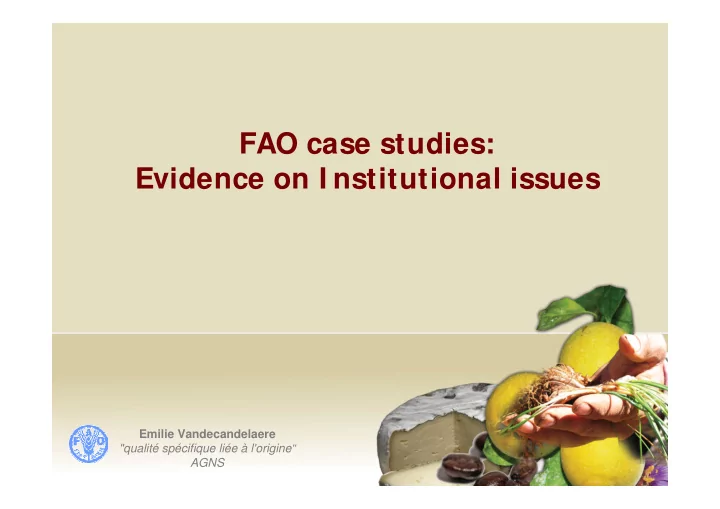

FAO case studies: Evidence on I nstitutional issues Emilie Vandecandelaere "qualité spécifique liée à l'origine“ AGNS
Outline 1. Main evidence by area • Latin America • The Mediterranean • The Balkans 2. Key points 3. Towards recommendations...
Main evidence by area
Latin America • Legal and institutional framework linked to the globalization and economic trade organizations: International conventions or Agreements (Paris, Madrid, Lisbon, ADPIC); Andean countries : Decision 486. � GI definition is generally one of TRIPS Agreement, within IP law. • GI is firstly an intellectual property tool : • Legal and institutional framework exist for registration (IP office) • Code of practice/Specifications assessment, follow up, control, certification, information to consumers (no logo) are weak or not considered � at the local level: difficulties for managing the seal. • Emerging or confirmìng interest for GIs as a tool for rural and agricultural development within IP offices and with the involvement of other Ministries (Agriculture), institutions and NGOs.
Latin America Regulatory framework often perceived as incomplete, regarding: - the effective IP protection with an adequate system of certification (or verification) and control (or auto-control) - the coordination between sectors (IP, trade, agriculture...), each one being complementary regarding their competences, and better representation of all stakeholders - the link with the local: top down or bottom up/ public- private? - its potential for rural development with policies and support � sharing methodology, experiences to better know GI tools and analysis of impacts (social and economic)
The Mediterranean (North Africa and Middle East) Legal frameworks with competition rules, trademark in general and special protection: • Register : IP (Turkey, Jordan, Lebanon); IP+Agri (Morocco); Agri (Tunisia) • Public control in Tunisia, Lebanon; certification in Morocco, Jordan • Institutional organization in process with some improvement of the regulatory framework regarding the problems encountered (applicants; clarification between TM and sui generis ; distinctions between production and processing areas; protection for third country IG...) Influence of European markets and multilateral/bilateral negotiations, with adaptation to the national context
“The Mediterranean” (North Africa and Middle East) Coordinated approach: • Links with other specific quality schemes (Morocco, Tunisia) • Information to consumers (Logo in Morocco; in process in Jordan and Lebanon) • National commission (coordination and assessment) (Morocco, Tunisia, Jordan?) • Model for Code of Practice type (animal, vegetal) (Tunisia) Needs? • Support for regulations implementation based on the laws • Raise awareness of farmers and officials on value of GIs • Technical support for the chain value organization • Capacity building • Harmonization in the Mediterranean • Facilitation of third countries recognition (import and export)
The Balkans (case studies) •Complexity of the institutional framework due to the history •Former legal framework renewed with the application countries to EU • Serbia new law in 2006, existing former GIs; • Bosnia Herzegovina: IP law in 2002; IP law in 2004 and PDO-PGI regulation in 2004 • Macedonia: IP law in 2002, revised in 2004 Same model in the three countries: suis generis system • Definitions of concepts are similar to EU but systems differ: • IP office manages the register, low role of Agriculture ministries unless showing more and more interest • Applicant can be an individual or a firm, an association, an Industry Chamber, the State or local authority • No opposition procedure at the registration (15 days in Macedonia; cancellation possible after) • Code of practice (specifications) not made public to third parties and consumers • Certification by the State who gives the right to use the GI Low level of delegation of competences to the producers (control, definition of specifications)
The Balkans (case studies) Top down approach, no need for collective approach and producers organization Normative approach: quality labels perceived as tools to access international markets and organize/control productions as well for implement food safety standards As in Latin America, can be seen as a transitional stage as it is emerging interest for rural development and involvement of ministries of Agriculture as an example Needs? • Clarification of legal status and roles of institutions • networking, coordination between institutions • implementation of certification and control to allow credibility of the official seals • information and promotion to consumers
Towards recommendations
Key Points An international trend to protect quality linked to geographical origin under Intellectual Property, as requirement to WTO: recent development (compared to European countries), no previous experiences, but going quickly! IP laws established but time required to implement institutional framework integrating the different national objectives More challenging in developing countries: less resources and capacity to strengthen the institutional framework
Key Points GI is a neutral tool: policies will determine its capacity to contribute to rural development by taking into account (or not) the public goods that represent a reputation based on territorial resources Complexity of the GI schemes: multidisciplinary (legal-IP, agriculture, rural development, food technology, mixture of local competition and cooperation, ...) and multilevel (national/local with intermediaries) and public/private � an adapted governance to define! This complexity is a challenge but also the reason why it can contribute to rural development, having an integrative function, dealing with multifunctionnality... Complementary legal tools for protection (Neuquen, Cotija, Café Colombia...)
Draft recommendations • Sharing information, experiences and knowledge • Capacity building: technical, organizational, coordination and networking between sectors, institutions, public-private, local/national... – to manage complexity – to create synergy – to take into account all the potentialities for sustainable development (economics, environment, social, cultural) • Favor the IP-trade-Agriculture coordination for food and agricultural products • Support to the implementation of an adapted system (institutional framework and type of markets) to ensure guaranteed seal: (verification and auto control ; third party certification, public control...?) • Interest of regional approaches to build a common view based on similar socioeconomic/geopolitical context • Raise consumer awareness
THANK YOU
Recommend
More recommend